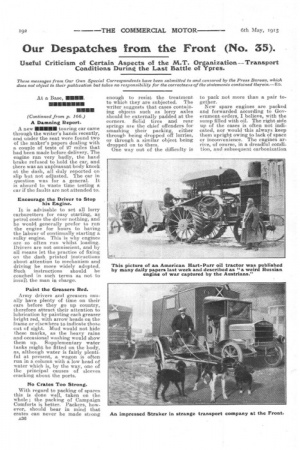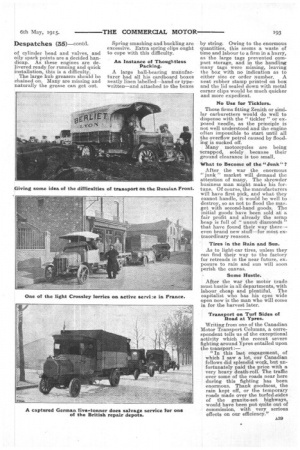Our Despatches from the Front (No. 35).
Page 12

Page 13

If you've noticed an error in this article please click here to report it so we can fix it.
Useful Criticism of Certain Aspects of the M.T. Organization--Transport Conditions During the Last Battle of Ypres.
These messages from Our Own Special Correspondents have been submitted to and censored by the Press Bureau, which does not object to their pubhcation but takes no responsibility for the correctness of the statements contained therein.—En.
At a Base, MIL 111111MMEON (Continued from p. 166.) A Damning Report.
A new MEM= touring car came through the writer's hands recently, and under the seat were found two of the maker's papers dealing with a couple of tests of 27 miles that had been made before delivery. The engine ran very badly, the hand brake refused to hold the car, and there was an unpleasant body knock at the dash, all duly reported on slip but not adjusted. The car in question was for a general. It is absurd to waste time testing a car if the faults are not attended to.
Encourage the Driver to Stop his Engine.
It is advisable to set all lorry carburetters for easy starting, as petrol costs the driver nothing, and he would generally prefer to run the engine for hours to having the labour of continually starting a sulky engine. This is why engines are so often run whilst loading. Drivers are not omniscient, and by all means let the practice of fixing on the dash printed instruotions about attention to mechanism and driving be more widely adopted. Such instructions should be couched in such terms as not to insult the man in charge.
Paint the Greasers Red.
Army drivers and greasers usually have plenty of time on their cars before they go up country, therefore attract their attention to lubrication by painting each greaser bright red, with arrow heads on the frame or elsewhere to indicate those out of sight. Mud would not hide these marks, as the heavy rains and occasional washing would show them up. Supplementary water tanks might be fitted on the body, as, although water is fairly plentiful at present, a wagon is often run in a column with a. low head of water which is, by the way, one of the principal causes of sleeves cracking about the ports.
No Crates Too Strong.
With regard to packing of spares this is done well, taken on the whole ; the packing of Campaign Comforts is better. Packers, however, should bear in mind that crates can never be made strong
A36 enough to resist the treatment to which they are subjected. The writer suggests that cases containing objects such as lorry axles should be externally padded at the corners. Solid tires and rear springs are the chief offenders for smashing their packing, either through being dropped off lorries, or through a similar object being dropped on to them. One way out of the difficulty is to pack not more than a pair together.
New spare engines are packed and forwarded according to Government orders, I believe, with the sump filled with oil. The right side up of the eases is often not indicated, nor would this always keep them upright owing to lack of space or inconvenience. The engines arrive, of course, in a dreadful condition, and subsequent carbonization of cylinder head and valves, and oily spark points are a decided handicap. As these engines are delivered ready, for running and quick installation, this is a difficulty.
The large hub greasers should be chained on. Many are missing and naturally the grease can get out. Spring smashing and buckling are excessive. Extra spring clips ought to cope with this difficulty.
An Instance of Thoughtless Packing.
A large ball-bearing manufacturer had all his cardboard boxes neatly linen labelled—hand or typewritten—and attached to the boxes by string. Owing to the enormous quantities, this seems a waste of time and labour to a firm in a hurry, as the large tags prevented compact storage, and in the handling many tags were missing, leaving the box with no indication as to either size or order number. A neat rubber stamp printed on box and the lid sealed down with metal corner clips would be much quicker and more expedient.
No Use for Ticklers.
Those firms fitting Zenith or similar carburetters would do well to dispense with the " tickler " or ex-. posed needle, as the principle is not well understood and the engine often impossible to start until all the overflow petrol caused by flooding is sucked off.
Many motorcycles are being scrapped, solely because their ground clearance is too small.
What to Become of the "Junk" ?
After the war the enormous " junk " market will demand the attention of many. The shrewder business man might make his fortune. Of course, the manufacturers will have first pick, and what they cannot handle, it would be well to destroy, so as not to flood the marpt with second-hand goods. The initial goods have been sold at a fair profit and already the scrap heap is full of " uncut diamonds" that have found their way there— even brand new stuff—for most extraordinary reasons.
Tires in the Rain and Sun.
As to light-car tires, unless they can find their way to the factory for retreads in the near future, exposure to rain and sun will soon perish the canvas.
Some Hustle.
After the war the motor trade must hustle in all departments, with labour cheap and plentiful. The capitalist who has his eyes wide open now is the man who will come in for the harvest later.
Transport on Turf Sides of Road at Ypres.
Writing from one of the Canadian Motor Transport Columns, a correspondent tells us of the exceptional activity which the recent severe fighting around Ypres entailed upon the transport :— " In this last engagement, of which I saw a lot, our Canadian fellows did splendid work, but unfortunately paid the price with a very heavy death-roll. The traffic over some of the roads near here during this fighting has been enormous. Thank goodness, the rain kept off, or the temporary roads made over the turferbsides of the granite-set highways, would have been put quite out of commission, with very serious effects on our efficiency."






















